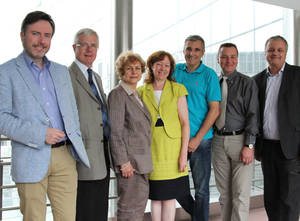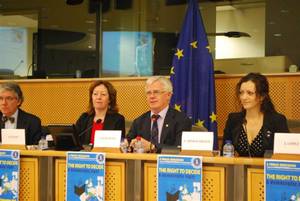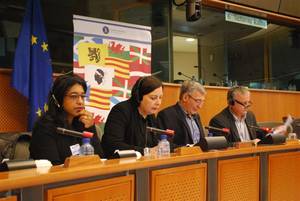e-fa: News Round-Up
news bulletin from the European Free Alliance Group in the European Parliament
October/November 2013 Round-Up
The European Free Alliance (EFA) draws together political parties fighting for democracy and self-determination for the stateless nations and regions of Europe. European Free Alliance MEPs sit in a European parliamentary group with the Greens, making up the fourth largest group in the European parliament.
EFA MEPs are:
- Jill Evans MEP - Plaid Cymru The Party of Wales (EFA Group President)
- Ian Hudghton MEP - Scottish National Party (EFA Group Vice-President)
- François Alfonsi MEP - U Partitu di a Nazione Corsa - Europe Ecologie
- Mark Demesmaeker MEP - Nieuw-Vlaamse Alliantie
- Inaki Irazabalbeitia MEP - Aralar
- Alyn Smith MEP - Scottish National Party
- Tatjana Ždanoka MEP - For Human Rights in a United Latvia

Highlights include:
- EFA Conference: The Right to Decide
- Minority language radio broadcasting
- Local language healthcare threatened by EU rules
- Stronger anti-smoking legislation
- ECHR Ruling on Basque prisoner
- Demesmaeker's UN visit
- Medical Devices
EFA Conference: The Right to Decide
Speakers from Catalonia, Scotland, the Basque Country, Wales, Galicia, and Quebec took part in a conference hosted by the European Free Alliance Group in the European Parliament on 13 November on 'The Right to Decide'.
The event focussed on the distinctive and different constitutional developments around Europe and elsewhere towards greater autonomy or independence for stateless nations, and peoples' democratic, constitutional right to self-determination.
The event was opened by Jill Evans, President of the EFA Group in the European Parliament. Jill said: "This is a very exciting time for all of us but especially for the European Free Alliance. Our existence is based on the promotion of this different kind of politics. We want a real Europe of the Peoples where there is real equality: equality of people, of cultures, of languages, of nations. We believe in a Europe which really does value its diversity in its widest sense.
"We believe in independence not dependence. I represent Wales. Wales is not a poor nation but it is an impoverished one because of successive London government policies. What is interesting about EFA is that we are a network of parties, moving in the same direction, travelling the same road but each making our own unique journey. We can support one another and share experiences, we can help one another along the way but we have to make the journey ourselves."

Former EFA MEP and current President of Esquerra Republicana de Catalunya (ERC) Oriol Junqueras addressed the conference. Oriol said: "In Catalonia we are European, pro-European and we want to continue being part of the European Union. A large social movement has developed in Catalonia with over two million people mobilising in favour of the right to decide on our own future. It would be difficult to find that elsewhere in the EU.
"Mobilising civil society has had direct political implications across Catalan society including various political and non-political movements. A majority in the Catalan parliament supports a referendum in 2014. According to the polls, if a Catalan election were held today, Esquerra, which supports Catalan independence, would win. I believe that in Europe, we will find a way for Catalonia to achieve its independence."
Speakers also included Ian Hudghton MEP, Francois Alfonsi MEP, Mark Demesmaeker MEP, Inaki Irazabalbeitia MEP, Daniel Turp, Tasmina Ahmed-Sheikh, Xavier Vence, Patxi Zabaleta.
Minority language radio broadcasting
A conference at the European Parliament in October organised by Basque MEP Inaki Irazabalbeitia recognised the importance of radio broadcasting in supporting minority languages.
Organised in conjunction with AMARC Europe and ELEN, the conference echoed previous calls for the European Commission to consider boosting financial support for minority languages in the period 2014 - 2020, including for minority language radio. The conference concluded with the publication of guidelines for measures to be taken for the effective development of radio broadcasting in minority languages.
Contributors included MEP Francois Alfonsi, who drafted the European Parliament's recent report on Europe's endangered languages. Both Alfonsi and Irazabalbeitia addressed the event in their native languages - Corsican and Basque respectively - and interpretation was provided into other European languages.
Opening the conference, Sally Galiana, President of AMARC Europe, the umbrella body for community radio stations, said: "A language is a way to see the world, and when a language dies, a part of the world dies."

Inaki Irazabaleitia said: "We have seen the vital role of community radio in supporting minority languages. Having a presence in the media is crucial for the survival of lesser used languages. It offers not only a chance to hear and use the language, it is also important in maintaining the status of a language and wider culture.
"The recent report by my colleague Francois Alfonsi has set out the dangers faced by some European languages. Media, including community language radio, will have a key role in ensuring the survival or not of some languages over the coming years. The EU has made a commitment to linguistic diversity. In this spirit, I urge the European Commission to look at the possibilities available to support minority language radio in the coming years. After substantial discussion and consideration, we are publishing a set of guidelines for measures to be taken for the effective development of radio broadcasting in minority languages."
Local language healthcare threatened by EU rules
EFA MEPs expressed concerns that new EU rules on recognition of qualifications could have unforeseen consequences for speakers of languages in bilingual areas such as Brussels and the Basque country.
Whilst supporting moves to make it easier for people to work in other EU countries, the new arrangements for recognition of professional qualifications only deal with official EU languages, and then only require a knowledge of one of a country's official languages.
This could be particularly problematic for Dutch speakers in bilingual Brussels or for Basque speakers in the Basque Country. And there are concerns that the ill-effects could be particularly felt in the health sector.
MEPs voted on the new rules for the mutual recognition of professional qualifications in Strasbourg in October where they were approved by a large margin. A separate vote on deleting language requirements was not carried.
N-VA MEP Mark Demesmaeker (Flanders) said: "We absolutely support the principle of free movement of people. My concern with these rules is the potentially unforeseen consequences when it comes to knowledge of the local language when working abroad. This could be a real problem in somewhere like bilingual Brussels where a doctor would only be required to speak one of the country's official languages. There would be no obligation to speak Dutch in order to work in a Brussels hospital, treating patients who may be Dutch speakers. I know from personal experience how difficult it can be for people to be treated by health workers who don't speak their language. That just doesn't make sense and must be changed."
Basque MEP Inaki Irazabalbeitia (Aralar) welcomed the principle of the proposal but criticised the effect on non-official languages: "These rules only require knowledge of one of the official state languages where a profession is to be carried out for that person's qualifications to be recognised. So it wouldn't require a knowledge of Basque to work as a doctor in the Basque Country, for example. A doctor could practice in the Basque Country, Catalonia, or Corsica, for example, without having any knowledge of the local language. That could lead to real communication problems with patients. This situation is simply not in line with the EU's stated principle of respect for linguistic diversity."
Stronger anti-smoking legislation
The European Parliament backed stronger anti-smoking measures in October, and EFA MEPs were supportive.
N-VA MEP Mark Demesmaeker, himself an ex-smoker, said the measures could have gone further. Mark commented: "I would have liked these measures to go further in a number of areas, but on the whole we have adopted stronger measures that will help prevent young people from starting to smoke in the first place."
The most important innovation is that health warnings will be required across the EU which will be a combination of text and illustration, though the Parliament reduced the area of the cigarette packet it will have to cover from 75% to 65%.
SNP President Ian Hudghton MEP supported the measures which will allow for EU Member states to take an even stronger line locally. Ian said: "In recent weeks the tobacco industry has been extremely busy in the corridors of Brussels and Strasbourg and some of their lobbying appears to have been successful. Nonetheless, Parliament has adopted some important measures today. I welcome the fact that Member States will be able to introduce tougher labelling laws than those provided for at EU level; this is line with the Scottish government’s tobacco strategy."
Demesmaeker in UN visit
EFA MEP Mark Demesmaeker was part of the official EU Parliament delegation to visit the UN General Assembly in New York at the start of November.
Mark is a member of the Parliament's Foreign Affairs Committee. The delegation met UN Secretary General Ban-Ki Moon and the Chair of the General Assembly.
Mark commented: "The UN and EU stand for quite similar values of peace and security. We've seen that the UN can be a powerful force for good, but much of that depends on the will of its member states. We discussed the need for UN reform and the EU's role in that process. Let's not forget that the EU is the UN's biggest contributor."
Reaction to ECHR ruling on Basque prisoner
EFA MEPs Iñaki Irazabalbeitia, François Alfonsi and Tatjana Zdanoka, held a press conference in Strasbourg in October to give their reaction to a European Court of Human Rights condemning Spain's treatment of a Basque prisoner.
The Court found that Spain had contravened the Convention by arbitrarily extending the sentence of a Basque prisoner beyond the thirty year maximum that can be imposed in Spain. The three MEPs are long standing supporters of the Basque peace process, and have called for EU support to help build a lasting and sustainable peace.
Iñaki Irazabalbeitia MEP (Basque Country) said: "I welcome the immediate release of Inés del Rio - it's a very positive signal which can help the Basque peace process move forward. The ECHR found that Spain's so-called 'Parot doctrine' whereby remission is granted against the total sentence rather than Spain's 30-year limit, breaches article 7 of the Convention.
"This verdict may deal with only one case, but it will have implications in many others. I hope that the Spanish government will respect the verdict of the court and not try to impede the implementation of its decision. This is an important step forward in the recognition of prisoners' rights. I hope that the understandable expressions of joy by the prisoners and the supporters of those to be released will be respectful of the pain suffered by the victims. Finally, I call once more upon the EU authorities to offer their support to the peace process in the Basque Country just as they did in Ireland."
François Alfonsi MEP (Corsica) said: "In the case of Northern Ireland, it came to a point where the UK government was ready to sit down and talk and compromise in order to build a lasting peace. Up to now, the Spanish government has refused to hold talks or compromise but this ECHR verdict may well be the impetus for new progress towards building a lasting peace."
Tatjana Zdanoka MEP (Latvia) commented: "We visited Spain in July and asked to visit a political prisoner to assess the situation for ourselves. Shockingly, our request was refused by the Spanish Justice Ministry. Now, following this ECHR ruling, Spain will have to live up to its human rights obligations. I hope it will help build the foundations for a durable and peaceful resolution to the conflict."
Medical devices
In October, the European Parliament backed new rules designed to improve the safety and quality of medical devices.
The tighter rules follow problems with breast implants in France. The new rules allow for stricter control, better traceability and more coordination in the supply of medical devices in Europe.
Mark Demesmaeker commented: "We're making sure that risky devices such as implants cannot come on to the market before they've been subject to strict tests and controls. There will also be common European standards that will improve safety and local authorities in the member states will carry out controls where necessary. This will help improve patient safety."






